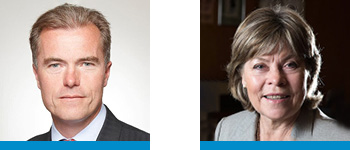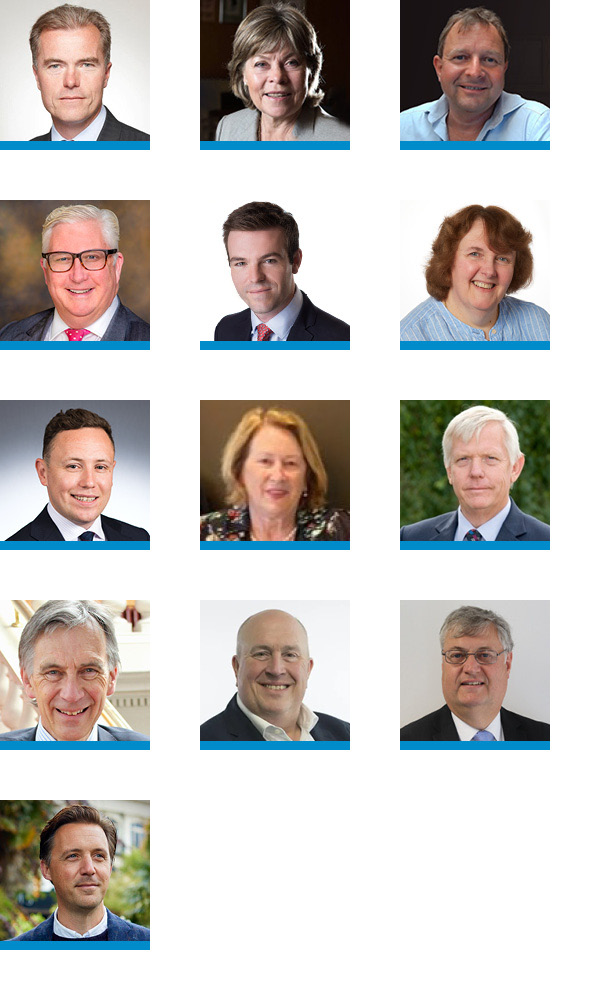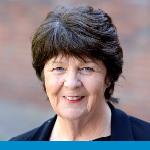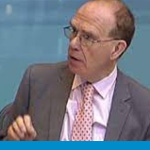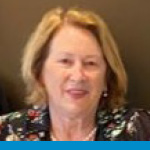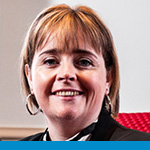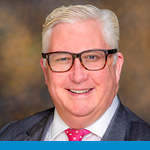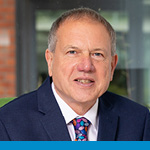The LGA Conservative Group produces an annual report so that Conservative councillors are kept informed about our activities and the wider work of the corporate LGA. We hope that you will find this publication, which covers the 2022/2023 LGA year and includes reports from our senior members, to be useful.
Introduction from Councillor James Jamieson OBE and Councillor Izzi Seccombe OBE
We would like to begin this report by acknowledging what a challenging 12 months it has been for the Conservative Party overall, but particularly for those of us involved in local government, due to the events that have taken place nationally.
The local elections results in May were extremely disappointing for all of us, with many excellent councillors losing their seats through no fault of their own. We understand and share your frustration that many years of hard work and achievements by Conservative councillors and councils were swept aside due to external events over which we had absolutely no control.
In the aftermath of the local elections, through meetings organised by the Local Government Association (LGA) Conservative Group, and in partnership with the Conservative Councillors’ Association (CCA), there has been the opportunity for colleagues to provide candid feedback to both senior government politicians and CCHQ staff on what went wrong and what needs to change.
One of the few upsides of the turmoil of the past year is that we have had the opportunity to engage even more closely than usual with our most senior politicians.
In partnership with the CCA, we were delighted to host the first hustings of the membership stage of the leadership contest between Rishi Sunak and Liz Truss. With photographers, camera crews and journalists camped outside 18 Smith Square, we welcomed Rishi and Liz to the LGA’s HQ where they addressed a packed room that was standing room only as well as the hundreds of other Conservative councillors who joined online.
Both candidates spoke about the importance of local government to the delivery of their key priorities and took questions on a wide range of issues. We also took the opportunity to personally present them with our LGA Conservative Group manifesto which highlighted the most important issues for local government and our key asks.
As a result of the changes in Downing Street there has obviously been a significant turnover in ministers, which has resulted in numerous thank you and congratulatory letters being sent as well as introductory meetings set up to establish new relationships. The summaries from our Conservative lead members on the LGA’s policy boards provide further details on the collaborative working with Ministers and MPs that has taken place over the past year.
We would also like to take this opportunity to thank Greg Clark and Simon Clarke for their engagement with us during their time as Secretary of State at the Department for Levelling Up, Housing and Communities (DLUHC), including the regular ‘Blue Team’ meetings.
In addition to ourselves, the councillor ‘Blue Team’ comprises Councillor Tim Oliver, Chairman of the County Councils’ Network, Councillor Sam Chapman-Allen, Chairman of the District Councils’ Network, Councillor Elizabeth Campbell, Conservative Group Leader London Councils (and prior to June, Baroness Teresa O’Neill), and Councillor Philip Broadhead, Chairman of the CCA.
These meetings have allowed us to raise issues of immediate importance as well as more strategic matters. We are very grateful to Michael Gove, Greg and Simon for taking time out of their busy schedules to meet with us, and also to the other Ministers at DLUHC for the meetings that we have had with them.
Our engagement with government over the past year through the ‘Blue Team’ meetings and other contact has resulted in various lobbying, legislative and financial ‘wins.’
For example, the announcement in April that councils will be allowed to keep 100 per cent of their right to buy receipts for 2022/2023 and 2023/2024 was excellent news and something that the LGA had long called for as the previous rules, alongside significant discounts to tenants, have meant that councils have struggled to replace homes on a one for one basis.
As Lord Porter, our colleague and former LGA Chairman, said in his own inimitable style, the announcement was a ‘massive win’ for the sector which makes Michael Gove a ‘council housing super hero’”
The Autumn Statement last November had various important announcements for local government which we welcomed at the time, including significant additional grant funding for adult social care and for the core schools’ budget in both 2023/2024 and 2024/2025.
The Chancellor also confirmed that, after listening to the concerns of local government, adult social care charging reforms would be delayed by two years, with funding being retained in local authority budgets to meet current pressures.
Other financial wins for the sector over the past year include the announcement of £257 million in funding to councils over two years to provide safe accommodation spaces and associated support for domestic abuse victims; the Department of Transport’s confirmation of £300 million in funding until 2025 to protect and improve bus routes and £200 million to continue capping single bus fares at £2 outside London until the end of October 2023; and £63 million to help publicly-funded swimming pools manage increasing cost pressures.
Elsewhere in this report, the summaries from our lead members on the LGA’s various policy Boards outline in more detail the work that they and their Conservative colleagues have undertaken across a wide range of areas and their achievements on behalf of the sector.
In addition to this report we regularly communicate with you in various ways throughout the year, including our fortnightly email bulletins through which we aim to keep you updated on key policy announcements, lobbying activity and forthcoming events.
We are also on Twitter, so please do follow us at @LGACons for all the very latest news and views from the LGA and the Conservative Group.
The LGA tries to be as accessible as possible to all members and its regular Councillors’ Forum meetings are open to all councillors from member authorities who wish to attend.
The Conservative Group meeting beforehand also offers an ideal opportunity for us to discuss key issues in a private political setting, and we are often joined by government ministers as well as other leading parliamentarians, officials from Conservative Campaign Headquarters, etc.
Details about forthcoming Councillors’ Forum meetings are included in our email bulletin, and if you wish to attend, please email the group office at [email protected]
Finally, as this year has been our last year as LGA Chairman and LGA Conservative Group Leader respectively we would like to take this opportunity to thank you for your support during the past four years and also for all of your hard work on behalf of your communities and the Conservative Party.
Whatever the frustrations of the past year, we hope you will agree with us that now is the time for us to look forward and come together as one Conservative team to ensure that we win both locally and nationally in 2024.
LGA Conservative Group Executive 2022/2023
The LGA Conservative Group Executive oversees and directs the work of the Conservative Group at the LGA. The members of the Executive for 2022/2023 were:
LGA Chairman – Councillor James Jamieson OBE (Central Bedfordshire Council)
Conservative Group Leader – Councillor Izzi Seccombe OBE (Warwickshire County Council)
Conservative Group Deputy Group Leader – Councillor John Fuller OBE (South Norfolk District Council)
County Council Executive Member – Councillor Kevin Bentley (Essex County Council)
Non-Met District Council Executive Member – Councillor Kelham Cooke (South Kesteven District Council)
London Borough Council Executive Member – Baroness O’Neill of Bexley (London Borough of Bexley)
Metropolitan Council Executive Member – Councillor Nicholas Jones (Bury Metropolitan Borough Council)
Unitary Council Executive Member – Councillor Linda Taylor (Cornwall Council)
'At large' executive members (four positions)
- Councillor David Fothergill (Somerset Council)
- Councillor Rory Love OBE (Kent County Council)
- Councillor Colin Noble (Suffolk County Council)
- Councillor David Renard (Swindon Borough Council)
Ex officio – Chairman of the Conservative Councillors’ Association – Councillor Phil Broadhead (Bournemouth, Christchurch and Poole Council).
LGA policy boards
The LGA is a politically-led organisation, and the members who are appointed to serve on its various Boards are responsible for developing its lobbying and policy formulation activities.
The LGA’s political groups make annual appointments to the boards. The number of places and lead member positions (chairman, vice chairman and deputy chairman) that they have to allocate are determined by the LGA’s overall proportionality figures which are calculated every May after the local elections.
The following summaries from our Conservative lead members outline the work that they and their colleagues have undertaken on your behalf over the past year.
We hope that you find these summaries useful. Further information about each board, including a list of all the Conservative representatives who serve on them, is available on the LGA website.
Councillors are appointed to serve on these boards annually. Nomination forms are sent to Conservative group leaders in June, the appointments are made in July, and they take effect at the start of the new LGA year on 1 September.
In September, the LGA holds a cross-party briefing day for all those councillors who have been appointed to the boards. This is an opportunity for senior members to outline the LGA’s priorities for the coming year and for those attending to ask questions or raise issues.
Each Conservative council group leader can nominate up to three councillors from their group. Those councillors who are interested in being appointed are asked to indicate which board(s) they are interested in serving on and whether they wish to be considered for the lead member position. Applicants are also asked to provide a short statement outlining their experience and suitability for the role.
We make a conscious effort to appoint opposition councillors as well as those from groups that are in control to ensure that a wide range of voices and experiences are heard.
In making the appointments the LGA Conservative Group Leader considers various factors.
The experience and expertise of each applicant combined with the information included in the personal statement is obviously important. We also seek to ensure that the appointments reflect our strength geographically as well as representing all the tiers of local government.
Each year we are heavily oversubscribed, with some boards being particularly popular, so we cannot offer a place to everyone who puts themselves forward. However, vacancies do occur, and we keep every application form on file for consideration when necessary.
When making these appointments we want to ensure that we have a strong and varied team that is representative of Conservative councillors across the country, which promotes and showcases the very best in talent from Conservative local government, and which will provide a strong Conservative voice within the LGA.
Children and Young People Board – Councillor Patricia Bradwell
The Children and Young People Board is responsible for the LGA’s activity relating to the wellbeing of children and young people, including education, social care, health and early years.
The board has covered a wide range of subjects over the past year, including youth services, special educational needs and disability (SEND), workforce capacity issues, the work of the Youth Justice Board, early years education and childcare, and children’s social care, to name just a few.
In March, we were delighted to welcome Claire Coutinho MP, the Minister for Children, Families and Wellbeing, to discuss both the Children’s Social Care Implementation Strategy and the SEND and Alternative Provision Improvement Plan. The Board also discussed the challenges facing councils and providers in delivering early years education and childcare and the shape that a reformed system could take.
We look forward to continuing to work with Claire and other members of the Department for Education ministerial team over the coming year.
In October, the Independent Inquiry into CSA published its overarching final report. We issued an initial response in which we committed to working with the Government on the Inquiry’s recommendations. We also took the opportunity to highlight our code of practice for councils responding to civil claims of non-recent CSA which we had published in response to a previous recommendation by the Inquiry
In November, the National Children and Adult Services (NCAS) conference met for the first time in person since 2019 when we gathered in Manchester. It was great to see so many Conservative colleagues from across the country at the conference and to have the chance to discuss a variety of important issues at our group meeting.
In terms of the main conference, we heard from a wide range of speakers, including Rachel de Souza, the Children’s Commissioner, and Amanda Spielman from Ofsted, whilst topics covered in the various sessions included youth work, early years, children’s social care reform, family hubs and co-production in SEND
Also in November, I was pleased to have the opportunity to chair a webinar on youth work where we heard from a number of different councils about the great work they are doing, the challenges they are facing and what they are doing to build youth services locally.
In February, along with the board’s other lead members, I met with council lead members for asylum and migration to discuss support for unaccompanied asylum-seeking children. We had some very useful conversations, including around support for children when they first arrive in the UK and how to ensure they receive the support they need going forward.
The board recently submitted responses to the Government’s consultations on children’s social care reform; our response to the overarching Stable Homes, Built on Love implementation plan is available online.
I would also like to take this opportunity to draw to your attention a new e-learning module for councillors on corporate parenting which has been launched on the LGA e-learning platform. This is available for all councillors and provides a useful introduction to the role, what it means to be a good corporate parent, and how councillors have a key role to play in supporting and encouraging children and young people in care to achieve their aspirations.
Similarly, the LGA offers a wide range of support for lead members for children’s services, including a model induction, which we encourage all lead members to take advantage of.
City Regions Board – Councillor Robert Alden
The City Regions Board has responsibility for LGA activity in relation to growth, transport, infrastructure, skills and wider public service reform. Its membership is drawn from the Core and Key Cities, the Special Interest Group of Metropolitan Authorities and the London Boroughs.
Although the City Regions Board is Labour-chaired and Labour-dominated, there has been plenty of scope over the past year for partnership working with colleagues on other LGA boards.
For example, along with the People and Places Board and the Community Wellbeing Board, both of which are Conservative-chaired, we approved the creation and co-sponsorship of a health devolution working group with the NHS Confederation to ensure that learning can be effectively shared between local government, the NHS and Integrated Care Systems (ICSs).
Meanwhile, in collaboration with the People and Places Board, the board agreed that the development of green jobs and the skills needed to deliver net zero and green economic growth in local economies is one of our shared priorities.
We have also jointly pressed for clarity around the rules for future rounds of levelling up funding and changes to reduce the cost to councils of bidding.
Along with lead members from the LGA’s Environment, Economy, Housing and Transport Board, lead members from both boards met with Kate Kennally, the local government representative on the Department for Business, Energy, and Industrial Strategy’s Green Jobs Delivery Group (GJDG).
This provided an ideal opportunity to raise various issues in relation to the creation of green jobs and the skills needed to support them.
Meanwhile, at the December GJDG meeting, LGA members’ input helped to secure a sub-group on local capacity and capability on developing green jobs and skills.
The board has also contributed to two pieces of commissioned work undertaken by Shared Intelligence to support local economies.
The first relates to the changing skills needs of economic development teams. The project aims to better understand economic development services and how they are delivered across England; the breadth of the work undertaken, how they add value locally, and the skills and capacity challenges they face, including those related to the delivery of local and national priorities.
The second project supports councils and combined authorities with the Local Enterprise Partnership (LEP) integration process. A final report will share good practice and highlight the opportunities and challenges of LEP integration.
In conjunction with the RSA, Core Cities, Key Cities and London Councils, we held the second urban summit in March. Over 100 people attended the in-person event to hear from a wide range of speakers. The event also saw the launch of ‘City Citizens,’ a series of commissioned videos, and the publication of an open letter from the leaders of Core Cities, Key Cities and London Councils setting out the case for further investment in cities.
Finally, I would like to place on record my thanks to Toby Savage, who was our group lead member and Board Deputy Chairman for most of the past year.
Following the birth of his second child earlier this year, Toby decided to stand down in May as both the leader of South Gloucestershire Council and as a councillor in order to spend more time with his family.
Toby was an accomplished and collegiate lead member, and I know that my Conservative Board colleagues, Councillor Barry Anderson, Councillor Joanne Laban, Councillor James Moyies, Councillor Simon Bennett and Councillor Lewis Chinchen, will join with me in thanking Toby for his work over the past year and in wishing him and his family all the best for the future.
Community Wellbeing Board – Councillor David Fothergill
The Community Wellbeing Board works to support local government in the delivery of its public health, health protection and mental health responsibilities, as well as issues relating to an ageing society and the reform and funding of adult social care.
Adult social care funding has continued to be a key priority for the Board over the past year, and the Autumn Statement contained the welcome announcement of extra funding of up to £7.5 billion for the period covering 2023/2024 and 2024/2045.
However, whilst any extra funding is positive news, this will address some, but not all, of the pressures. It therefore remains the LGA’s position that further significant investment in adult social care is required – a point we continue to make at every possible opportunity.
Within this context, it was encouraging that many of the issues that we have campaigned on in relation to adult social care were reflected in an important recent report on the future of care and support by the House of Lords Committee on Adult Social Care.
Having had the opportunity to give oral evidence to the Committee, I was pleased to see the report portray adult social care in a positive light and take, as its starting point, the people who draw on it. In particular, I strongly endorse the Committee’s view that it needs to be seen as a ‘national imperative’.
I also gave evidence to the Health and Social Care Committee in November as part of its inquiry into Integrated Care Systems (ICSs). I took this opportunity to emphasise the need for ICSs to have the freedom and space to agree and action their own priorities, adding that they should not bypass or duplicate place-based leadership but work with them and build from the bottom up. I also called on the Government and NHS England to reduce the number of targets for ICSs in order to allow leaders to focus on local system priorities.
I also welcomed the publication of the Hewitt Review of ICSs, and I am grateful to Patricia Hewitt for involving the LGA and wider local government stakeholders in each workstream that developed the findings and recommendations of the review.
In March we held the 11th LGA Annual Public Health Conference, organised in partnership with the Association of Directors of Public Health (ADPH) and the Faculty of Public Health (FPH). The conference - which included nine bitesize sessions on a huge variety of key public health topics, including community development, mental health, devolution and the future of public health - had a record attendance of almost 1,300 delegates registered across the three mornings alongside 43 speakers and chairs.
It provided a much-needed opportunity for the public health community to come together, share learning, and to plan for the future. Thank you to everyone who attended and participated in the sessions.
To coincide with the conference, the LGA launched the 2023 annual public health report, along with an animation for social media celebrating all that councils have achieved in the last decade.
March was a particularly busy month as my other engagements included chairing a free national webinar on adult social care assurance which brought together councillors, officers and senior figures from government, including the Minister for Social Care, Helen Whately; an introductory meeting with Richard Meddings, the Chair of NHS England; and attending the first meeting of a new adult social care capacity group, which provides advice to the Department of Health and Social Care on how to achieve sustainable growth in the capacity of adult social care services, with a particular focus on preparing for winter.
Meanwhile, in April, I was pleased to attend the first meeting of the NHS Confederation and LGA joint working group on Health and Devolution.
As I reflect on the last 12 months, I am struck again by the enormous – and often daunting – volume of work that councils have had to contend with across adult social care, public health, health integration and wider wellbeing.
The dedicated work that you and your colleagues continue to do in councils across the country is inspiring, deeply valued, and makes a real and lasting difference to people’s lives. On behalf of the Board, I would like to thank you for all that you do.
Culture, Tourism and Sport Board – Councillor Peter Golds CBE
The Culture, Tourism and Sport Board provides strategic oversight of all the LGA’s policy and improvement activity in relation to libraries, the visitor economy, sport and physical activity, the arts, museums, public parks, and heritage.
Given the significant changes and challenges that the culture, tourism and sport sectors have experienced over the last three years, I was delighted to serve as the board’s representative on the LGA’s Commission on Culture and Local Government.
With councils investing £1.1 billion in cultural services each year, the commission explored how local culture can be used to support mental wellbeing, provide educational opportunity, and boost the economy as part of our recovery from the pandemic.
Its final report, Cornerstones of culture, identifies four key ‘cornerstones’ essential to a healthy local cultural ecosystem: capacity, leadership, funding and evidence.
It also sets out detailed recommendations for securing the future of local publicly funded cultural services. The report says that greater collaborative work between councils and cultural partners, combined with streamlined place-based funding from government, is crucial to supporting one of the fastest growing parts of the economy.
As part of the commission, four case study films were created in partnership with councils, local organisations and residents to clearly demonstrate the value of cultural services.
The commission also received a number of case studies from councils, showcasing how they have used cultural services and activities to boost social mobility, tackle health inequalities, enhance pride in place, and grow sustainable and inclusive economies. I hope that you will find them useful when planning your own services.
Over the past year, I was also pleased to represent the board on the libraries working group and the Chiles Webster Batson Commission on sport and low income neighbourhoods.
Earlier this year, the Government responded to the Culture, Media and Sport Committee’s report report on cultural placemaking, which the LGA submitted evidence to.
They noted the Department’s involvement with the Commission on Culture and Local Government, and that they would continue to engage closely with the LGA on next steps. The response also highlighted the work we are doing to support and develop the skills and capacity of local authorities – specifically referencing the Leadership Essentials: Cultural Services programme that we run in partnership with Arts Council England (ACE).
In February, we were delighted to welcome the Sports Minister, Rt Hon Stuart Andrew MP, to our Board meeting. We took the opportunity to highlight, amongst other things, the pressure of rising fuel bills on council-run swimming pools.
I was therefore delighted that the Chancellor subsequently confirmed that £63 million would be made available to local authorities to help publicly-owned swimming pools manage the increasing cost pressures. I’d like to take this opportunity to again thank the Minister for his engagement with the LGA in relation to this. Thank you also to all those who wrote to their local MP and supported the LGA and UKactive’s lobbying efforts on this issue.
In March, we held the LGA’s annual Culture, Tourism and Sport Conference, with keynote speeches from LGA President and Paralympian Baroness Tanni Grey-Thompson, and Baroness Lola Young, Chair of the Commission on Culture and Local Government.
The conference clearly demonstrated the huge contribution that culture, tourism and sport can make to delivering on levelling up, and colleagues ended the day with a walking tour of the impressively renovated London Coliseum. It was great to see so many attendees in-person, and thanks are due to all the speakers for making the conference such a success. Presentations from the day are available online.
I would also like to use this opportunity to draw your attention to the fact that he LGA has published a new toolkit, developed with Locality, to support councils to develop strong, strategic relationships with their local voluntary and community sectors (VCS). This builds on research published last year by the LGA which highlighted the variable quality of such relationships and identified some of the key barriers to better partnership working. The toolkit aims to help lead members and officers to put some of that learning into practice.
If you are interested in receiving all the latest news from the board, please visit our Culture, Tourism and Sport web pages and follow us on Twitter @LGAculturesport. You can also share good practice or raise an issue by emailing [email protected].
Finally, as this was my final year as our lead member on the board, I would like to take this opportunity to thank all of my Conservative colleagues for their hard work and contributions. They are all strong champions for the opportunities that the culture, tourism and sport sector provide, whilst also ensuring that a strong Conservative voice is heard both within the LGA and at external meetings and events. I am proud of all that we have achieved together.
Environment, Economy, Housing and Transport Board – Councillor Linda Taylor
The Environment, Economy, Housing and Transport Board provides oversight of the LGA's policy, regulatory and improvement activity in relation to transport, local economic growth and regeneration, housing, planning, flood risk management, waste and climate change.
I would like to begin this report by acknowledging David Renard, the board’s former Chairman, who unfortunately was not re-elected at the local elections in May.
David was an extremely knowledgeable and experienced Chairman who was respected across the party divide for the professional and courteous way in which he both oversaw our meetings and represented the LGA externally over the past four years.
During the past year, David led our engagement with senior parliamentarians, including meeting with Richard Holden MP following his appointment as Parliamentary Under Secretary of State at the Department for Transport, with Rebecca Pow MP, Parliamentary Under Secretary of State at the Department for Environment, Food and Rural Affairs (Defra), and Iain Stewart MP, the Chair of the Transport Select Committee.
David used those meetings to raise a variety of issues, and his lobbying in relation to bus funding paid off in February when the government announced the extension of the £2 bus fare scheme and an extra £80 million in funding to support thousands of vital bus routes.
In May, both schemes were further extended when the Secretary of State for Transport, Mark Harper, confirmed £300 million in funding until 2025 to protect and improve bus routes and £200 million to continue capping single bus fares at £2 outside London until the end of October 2023 (and then at £2.50 until the end of November 2024).
On behalf of the Conservative board members, I would like to thank David for his many years of service to the LGA and wish him well for the future. I am very keen to follow his example of collaborative working to ensure the best outcomes for the people and communities that we all represent.
On the legislative front, the board has focused on various important pieces of legislation over the past year.
On the Social Housing Regulation Bill, we briefed parliamentarians as the legislation progressed through both Houses and welcomed proposals to strengthen the role of the Social Housing Regulator to further protect the rights of tenants.
We met with the Health and Safety Executive in September to discuss the Building Safety Regulator, and we have held webinars explaining the implications of the Fire Safety Act.
I am delighted that the 2022/2023 Housing Advisers Programme resulted in 21 successful projects being selected, with more than 90 councils and other partners benefiting.
Meanwhile, the 2023 Leadership Essentials Housing Course took place in January at Warwick Business School. This year’s theme was ‘Leading through challenge,’ and, in addition to green homes and housing delivery, there was a focus on councils’ role in raising housing quality in both the social and private rented sectors.
In April, the LGA ran a joint Ministerial workshop with DLUHC to discuss Housing Revenue Accounts (HRA). Eleven councils attended the session with the LGA Chairman, James Jamieson, Rachel Maclean MP, Minister for Housing and Planning, and Baroness Scott of Byebrook OBE, Parliamentary Under Secretary of State at the DLUHC, to discuss the challenges local authority landlords face in managing social housing stock, delivering priorities and meeting regulatory requirements.
DLUHC and LGA officials are taking forward the issues discussed, and a series of virtual council roundtables are also being planned for later this year.
As ever, planning has been a key focus for the Board, and the LGA responded to the Government’s consultation on proposals to reform national planning policy in March.
In our response we welcomed a number of the proposals, including the removal of the requirement for councils to maintain a rolling five-year housing supply and the principle of a permissions-based test that will ‘switch-off’ the application of the presumption in favour of development for those authorities that can demonstrate they have permitted sufficient numbers of housing units to meet their local need.
Our response also highlighted areas of concern, which included transitional arrangements and the lack of detail on National Development Management Policies.
In April, the LGA responded to the Government’s technical consultation on proposals to increase planning application fees and improve the performance monitoring framework for planning departments.
Whilst we welcomed the proposal to increase planning application fees, our modelling showed that even if all application fees were uplifted by 35 per cent the overall national shortfall for 2020/2021 would have remained above £80 million. We continue to call on the Government to allow councils to set planning fees at local level to cover their costs.
The LGA’s nutrient and water neutrality inquiry published its report in March, and the press release to accompany this set out the need for urgent action and funding to ensure that 20,000 homes on hold due to this issue can be built.
It is therefore good news that the government has invited impacted councils to submit evidence and expressions of interest for additional funding for projects to unlock housing developments. There was further good news when Natural England launched a mitigation credit scheme for developers building in nutrient neutrality areas in the Tees catchment area.
Prior to the publication of its report, ‘Mission Zero’, in January, the LGA engaged with the Independent Review of Net Zero led by Chris Skidmore MP, including holding a roundtable with him and his team.
The report recognised the critical role of councils and emphasised that there must be more place-based, locally-led action on net zero, with key LGA positions referenced throughout. It also recommended funding consolidation and simplification, reform of planning and the viability system, whilst also recognising the importance of council capacity building and the need for a political element to the Local Net Zero Forum.
It was therefore very encouraging that the first Ministerial Local Net Zero Forum took place in February. The discussion focused on the recommendations contained in ‘Mission Zero’, and it was agreed that it will meet every six months and be co-chaired by the LGA Chairman.
Finally, Defra’s Resources and Waste Strategy has been a key issue for the Board over the past year. It includes a framework for the consistent collection of materials for recycling from households and businesses, and it is expected to bring in mandatory weekly food waste collections as well as introducing a core set of materials that councils will have to collect.
At the time of writing, we are awaiting confirmation of the implementation dates and details, but the LGA is represented on various stakeholder groups and has regularly emphasised the need for councils to be adequately funded for any additional responsibilities.
Having consistently highlighted the need for Defra to work with local government on these issues and to provide a clear timetable for the overall package of reforms, the board will continue to monitor this issue closely over the coming year.
Improvement and Innovation Board – Councillor Abi Brown
The Improvement and Innovation Board has responsibility for LGA activity in relation to improving councils’ performance, including peer support and mentoring, as well as relations with the various central bodies who contribute to that process.
The LGA’s sector-led improvement programme, which is funded through a grant from the DLUHC, encompasses a broad range of programmes based on what works for improvement: strong political and managerial leadership and workforce, support and challenge from one’s peers, the ability to benchmark performance against others, use of comparable data, and the sharing of good practice.
I am pleased to report that our programme maintained its strong track record of delivery during 2022/2023, with 92.5 per cent of KPIs fully achieved. The LGA will be updating its sector support for 2023/2024, with continued funding of £18 million from DLUHC. The programme has been shaped, and will continue be shaped, through direct engagement with councils to ensure that they have the support they most need.
Over the past the year the LGA has also undertaken a review of our peer support offer. This confirmed that peers make a vital contribution to sector-led improvement and are highly regarded. Recommendations arising from the review are being taken forward, including ensuring that we have the experienced, skilled, and diverse cohort that councils require, and providing them with the support and training they need to undertake the role effectively.
In my role as the Chair of the Board, I want to reassure Conservative councillors that I, along with other LGA colleagues, have been lobbying central government on behalf of the sector in relation to the development of the new Office for Local Government (Oflog).
Lee Rowley, the Minister responsible for Oflog, accepted my invitation to speak at the LGA Councillors’ Forum in March, and I am pleased to lead a group of LGA politicians who meets with him regularly to contribute to its strategic design, development, and implementation.
Alongside colleagues, I continue to point out that councils already provide and use extensive data on a wide range of topics, which the LGA supports through LG Inform, our award-winning data benchmarking tool. DLUHC officials are interested in seeing how the LG Inform Headlines Report might be used to strengthen future iterations of Oflog.
For those not familiar with LG Inform or LG Inform Plus, the 2022 review of the year provides a comprehensive overview of both resources. If you would like more information, please email [email protected] or [email protected]
I also wish to acknowledge the engagement of Lord Morse, the interim Chairman of Oflog, who has met with various LGA representatives, including myself, on several occasions. These meetings have been very useful, and I would like to thank him for his time.
I was delighted to have the opportunity to chair the LGA’s Member Peer Conference in Sheffield in November. This was the first in-person conference for three years and was attended by over 100 member peers.
In addition to a wide variety of workshop sessions, delegates heard from Max Caller CBE, Government Strategic Adviser, and Pat Ritchie CBE, the former Chief Executive of Newcastle City Council, on the challenges facing the sector and how the LGA’s sector-led improvement (SLI) offer can help to address them. Stephen Baker, the former Chief Executive of East Suffolk Council, also shared his experiences as an officer peer, including how to get the best from Corporate Peer Challenges (CPCs).
I would like to take this opportunity to highlight the LGA’s Debate Not Hate campaign, which aims to tackle the abuse and intimidation that councillors can face for carrying out their role.
At a parliamentary event in December we launched the new Debate Not Hate toolkit which provides councils and councillors with a range of resources, including social media assets, virtual meeting backgrounds, posters and template letters. I would also encourage you to sign our public statement.
In the run-up to the 2022 United Nations Climate Change Conference (COP27) in Sharm El Sheikh, we showcased good practice examples of councils taking climate action through our Pass the Planet campaign.
Our Cyber, Digital and Technology (CDT) team have a new website. The new pages bring together the LGA’s work to support the cyber-resilient digitalisation of councils and the communities they serve. You can find information, advice, and guidance on topics such as connectivity, digital inclusion, security, and resilience.
We have also launched a Twitter account @LGAcyberdigital to share news, information and events from our CDT Programme and updates from the sector.
Finally, I would like to take this opportunity pay tribute to my predecessor as Board Chair, Councillor Peter Fleming, who unfortunately lost his seat at the local elections in May.
Peter was an outstanding Board chairman, a tireless advocate for the sector, a very popular member peer, and a highly respected Leader of Sevenoaks District Council. He continued to serve on the board over the past year, and I personally will greatly miss his experience, his contributions, and, last but not least, his always interesting and distinctive sartorial choices!
On behalf of the whole board, I would like to thank Peter for his many years of service to the LGA and wish him all the best for the future.
People and Places Board – Councillor Kevin Bentley
The People and Places Board focuses on the role of non-metropolitan authorities in enabling economic growth for the long-term benefit of residents, and on how transformation in public services can enable that.
As the Chairman of the People and Places Board, one of my key responsibilities has been to maintain a strong media presence to ensure that the views of the sector are clearly and regularly articulated to as large an audience as possible.
In the Autumn of 2022, I was therefore pleased to be quoted in the national and trade press on the urgent need for government to approve local investment plans for the UK Shared Prosperity Fund (UKSPF). I subsequently welcomed the approval of these plans by DLUHC.
Similarly, following the announcement of the second round of the Levelling Up Fund, I represented the LGA in national press coverage, including on the BBC’s The World at One, to emphasise that whilst the extra investment in local areas was very welcome, levelling up funding should be determined on the basis of where crucial investments need to go rather than costly competitive bids between areas.
As part of our own contribution to the levelling up agenda, the LGA’s Levelling Up Locally Inquiry report was published in March. This was the culmination of a year-long series of roundtables gathering evidence from independent experts about how best to bridge the gap between national ambitions and the priorities of local leaders and communities in relation to levelling up. The inquiry concluded that the role of councils and combined authorities in promoting economic growth and prosperity should be formally recognised, including being able to fairly keep and reinvest the proceeds of local growth according to local need.
I was pleased to launch the report at a hybrid event with over 100 attendees, and the inquiry’s findings will be used to inform the Board’s work in the 2023/2024 cycle, with a planned Devolution All-Party Parliamentary Group session exploring its recommendations.
At our March meeting we welcomed National Farmers Union (NFU) President Minette Batters and Tim Goodship from the Environment Strategy Directorate at the Department for Environment, Food and Rural Affairs (Defra) to discuss rural proofing policy and how rural interests will be integrated across the Government’s approach to levelling up. The board will use this discussion to develop work during the 2023/2024 cycle relating to levelling up rural areas and ensuring future policy is rural proofed.
Earlier this year, the Board agreed the creation and co-sponsorship of a health devolution working group with the NHS Confederation. This will provide an opportunity to ensure that learning can be shared between local government, the NHS and Integrated Care Systems (ICSs). The three boards with an interest in health devolution (the People and Places Board, the City Regions Board, and the Community Wellbeing Board) have all nominated a representative on the working group.
The LGA continues to promote the crucial role of local government in employment and skills through our Work Local campaign, and in April I represented the board at a meeting with the Skills Minister, Robert Halfon. This was a useful first step in our attempts to create stronger ties at both a political and officer level between the LGA, councils and the Department for Education.
The Board continues to raise concerns about the integration of all analogue lines to digital internet-based infrastructure. As part of this process, LGA officers organise monthly switchover working group meetings to discuss the challenges and share good practice between regions. The results from an LGA commissioned readiness survey reconfirmed the four areas where councils require better support: safe data sharing, funding, communications support and the central testing platform.
I am particularly grateful for the involvement of my Conservative colleague Councillor Mark Hawthorne, our LGA digital champion, who attends regular meetings with key stakeholders on this issue.
Finally, having had the honour of being elected as the LGA Conservative Group Leader for 2023/2024, this will be my last report as the People and Places Board Chairman. I would like to take this opportunity to thank all of my Conservative colleagues who have supported me during my time as Chairman, and I will of course continue to maintain a strong interest in the Board and its important work in my new role.
Resources Board – Councillor Richard Wenham
The Resources Board shapes and develops the LGA’s policies and programmes in relation to local government finance, strategic finance, welfare reform, and workforce issues.
The November Autumn Statement saw the Chancellor of the Exchequer announce additional grant funding for adult social care and for the core schools’ budget in both 2023/2024 and 2024/2025. The Chancellor also confirmed that, after listening to the concerns of local government, adult social care charging reforms would be delayed by two years, with funding being retained in local authority budgets to meet current pressures.
As we said in our media statement, it was good that the Chancellor acted on some of the LGA’s key asks, and our briefing summarised the most important announcements impacting councils and the LGA’s response to them.
In February, the Government published the final local government finance settlement 2023/2024 accompanied by a Written Ministerial Statement, which was broadly in line with the provisional settlement that was published in December. The main change was an increase in Core Spending Power (CSP) from 9.2 per cent to 9.4 per cent.
The Government also published an explanatory note on adult social care grants and announced that every authority in England will receive a share of the £100 million accumulated surplus currently held in the business rates levy account.
We continue to make the case for multi-year settlements and for more long-term certainty around funding and budgets. We want to work with government on a long-term funding plan which guarantees resources, certainty and freedoms for councils to deliver services.
We also continue to push for clarity on issues such as the financial implications of Extended Producer Responsibility, the Fair Funding Review, the New Homes Bonus and the business rates reset.
In January, we held the first in-person LGA Local Government Finance Conference at Smith Square since 2019.
Speakers at the sold-out event included Lee Rowley MP, Parliamentary Under Secretary of State at the Department for Levelling Up, Housing and Communities (DLUHC), the LGA Chairman, Councillor James Jamieson, senior officers from member councils, government officials, and economists from the Institute for Fiscal Studies.
In April, representatives from the LGA attended two separate round tables with Lee Rowley to discuss the backlog in local audit.
The sessions brought together high-level representatives from local government, audit firms, and regulators, as well as DLUHC and HM Treasury, to discuss solutions to the current situation. The LGA representatives highlighted the need to focus on matters of higher risk and importance and to reduce the focus on areas that have less real impact on councils.
In May, my Conservative Board colleague, Councillor David Leaf, chaired a Cost of Living webinar. The session, which was attended by over 300 members of the LGA’s Cost of Living Network, included contributions from councils from across the country, sharing insights, strategic leadership and practical examples.
Finally, I would like to highlight the fact that the LGA has published a councillor workbook on finance for non-finance portfolio holders / cabinet members and an councillor e-learning module for the same purpose. These resources have been designed to enable councillors to better understand the financial aspects of their roles, and I hope that you will find them useful.
Safer and Stronger Communities Board – Councillor Lewis Cocking
The Safer and Stronger Communities Board has responsibility for the LGA’s activity relating to the promotion of the safety of local communities, including issues of crime and anti-social behaviour, police governance and accountability, community safety, public protection, the fire service and emergency planning, and licensing and other regulatory activities.
It has been another busy year for the Board, with our work covering a wide range of topics such as modern slavery, community cohesion, building safety, the Independent Review of Prevent, the Manchester Arena inquiry and the strategic relationships between councils and their local voluntary and community sectors, to give just a few examples. In March we also had a very useful briefing from officials from the National Protective Security Authority.
I would like to thank all of my Conservative colleagues for their active participation in the Board meetings. Working together we have provided a very strong Conservative voice on a Labour-chaired Board.
I would particularly like to thank those colleagues who represent the Board on outside bodies or undertake champion roles. For example, Councillor Lois Samuel has continued to serve as the Board’s Domestic Abuse Champion, in which capacity she regularly attends the Domestic Abuse Commissioner’s strategic group.
Domestic abuse is one of the most important issues covered by the Board, and I strongly welcomed the announcement last December of £257 million in funding over two years for councils to provide safe accommodation spaces for domestic abuse victims as well as counselling, assistance with rehousing, financial advice and play therapy for traumatised children.
The recently published UK Government Resilience Framework envisages a greater role for local leaders in local resilience work. In our submission to the consultation on the new framework, the LGA called for the important role of councillors in relation to this to be recognised, and we were pleased to see this happen. Ahead of the launch of pilots testing different aspects of the framework, we published a series of case studies highlighting how councillors are already supporting local resilience activities throughout the country.
Anti-social behaviour (ASB) is another key area covered by the Board, and following the Prime Minister’s speech on building a better future and the subsequent launch of the ASB action plan, which aims to give the police and other agencies the tools they need to discourage such activity, we are working closely with the Home Office and the Department for Levelling Up, Housing and Communities on the implementation of the plan. If you have any case studies or insights from your area that you would like to share with us please do email [email protected].
In February, the LGA formed a national Modern Slavery Network which meets quarterly to share good practice and discuss current issues. If you would like your council to be represented, please email [email protected] for further information. The LGA has also published an updated version of its council guide on modern slavery, as well as a supporting maturity matrix which enables councils to assess their work. The new guidance is available on the modern slavery section of our website alongside other supporting materials.
The recently published Gambling Act Review White Paper contained the welcome news that the government will review the fees which local authorities can charge for premise licences; that it intends to introduce a formal system of cumulative impact assessments when parliamentary time allows; and that it will consult on new powers for councils to tackle underage gambling in alcohol licensed premises. The LGA will work closely with the government as they seek to implement the various provisions outlined in the white paper.
The LGA has also developed a councillor handbook on public protection services, which provides an overview of environmental health, trading standards and licensing services. Councillors can use this guide to develop their understanding of what to look out for when scrutinising or leading these services within their own council.
Good practice case studies on effective approaches to scrap metal licensing have also been published. If your council has an example to share, please email [email protected]
Meanwhile, our annual Licensing Conference, which was held in February, included a wide range of expert speakers who covered issues such as licensing and counterterrorism, how to secure alignment between licensing and planning regimes, and best practice in fee setting.
The LGA has also developed a new section of its website to collate all our training materials and information for members of licensing committees. This includes a free e-learning module, a series of scenario based licensing videos, and councillor handbooks on licensing. We have also produced a flyer to promote the benefits of being on a licensing committee to new members. The flyer emphasises that licensing gives members an opportunity to link into different strategic agendas within their council, whilst also providing an opportunity to play a more active role in operational decisions that affect their local area.
I hope that you find these resources useful in your work as councillor.
Fire Services Management Committee and Fire Commission – Councillor Rebecca Knox
The Fire Services Management Committee and the Fire Commission represent the views of fire authorities in relation to service modernisation and all other fire related issues.
I would like to introduce myself as the Conservative lead member and Deputy Chairman of the LGA’s Fire Services Management Committee (FSMC). I am very pleased to have been asked to undertake this role, and I would also like to place on record my thanks to my predecessor, Councillor Nick Chard, for all the work that he did over the previous four years.
I am a longstanding member of the FSMC and Fire Commission, and in addition to this role I chair the Dorset and Wiltshire Fire and Rescue Authority.
Over the past year the FSMC has discussed a range of issues relevant to the fire sector, including building safety, the Emergency Services Mobile Communications Programme, the Manchester Arena Inquiry report, finance, sector-led improvement, workforce issues, the findings from ‘State of Fire and Rescue: The Annual Assessment of Fire and Rescue Services in England 2022’, and plans for the next round of inspections.
The LGA submitted a response to the Government’s Reforming our Fire and Rescue Service White Paper last year. This welcomed the ambition to improve the Fire and Rescue Service and the reform agenda whilst highlighting proposals which needed further consideration and practical solutions as to how they could be developed. The response also outlined potential barriers to reform and areas where the LGA believe change could be achieved more quickly.
We are awaiting further developments in relation to the white paper, and we anticipate that legislation may be brought forward in our 2023/2024 meeting cycle.
In March, I was pleased to join over 150 delegates attending the LGA’s Annual Fire Conference in Nottingham. The theme for the conference was ‘Building Resilience for the Future of the Fire Service’. Chris Philp MP, Minister of State for Crime, Policing and Fire, delivered the keynote address, updating us on the Government’s fire reform programme.
As ever, the workshops provided an opportunity to discuss a wide range of interesting topics such as the core code of ethics, sector-led improvement, Personal Emergency Evacuation Plans (PEEPs) and research from Shropshire Fire and Rescue Service in relation to ‘on call’.
Also in March, His Majesty’s Inspectorate of Constabulary and Fire & Rescue Services (HMICFRS) published a report on values and culture in fire and rescue services. This included specific recommendations for the LGA, the Fire Standards Board, fire and rescue authorities and chief fire officers. The National Fire Chief’s Council (NFCC) have also published their draft culture action plan for feedback.
We are engaging with the NFCC, HMICFRS, the Home Office, and the unions in response, and we will be holding a free one-day conference which will examine members’ governance and leadership role in relation to workplace culture.
The Fire Standards Board has also launched two new fire standards on ‘Leading the Service’ and ‘Leading and Developing People’. These have been developed to support fire and rescue services strengthen professionalism and leadership at all levels.
In April, Councillor Chard represented the LGA at the Joint Emergency Services Interoperability Principles (JESIP) Ministerial Oversight Board which was attended by ministers from the Home Office and the Departments of Health and Social Care and Levelling Up, Housing and Communities. The meeting focused on the second report from the Manchester Arena Inquiry and its recommendations on how to improve emergency service interoperability at incidents.
Finally, I would like to finish this report by thanking former FSMC and Fire Commission member Eric Carter for his longstanding service to both bodies. Unfortunately, Eric lost his seat on Telford and Wrekin Council at the local elections which meant that he could no longer be involved at the LGA.
Eric also served on Shropshire Fire and Rescue Authority for many years and was its Chairman at the time that he lost his seat.
I know that I speak for all of my Conservative colleagues when I say how much I valued Eric’s work on the FSMC and the Fire Commission, his wise counsel, and his loyal support. We thank Eric for his service and wish him all the best for the future.
LGA Conservative member peers
The work of the LGA’s member peers is a core component of its sector-led improvement offer to councils.
Peers undertake a variety of tasks, including one-to-one mentoring of other councillors, facilitating training sessions on specific topics, and participating in Corporate Peer Challenges (CPCs), where a council’s overall performance, or its performance in a specific service area, is assessed over a number of days.
As experienced councillors, peers bring credibility, trust and mutual respect to the review process. Sharing knowledge and learning is a key feature of their work, particularly during CPCs. Peers both challenge and reassure, drawing on experiences from their own council, the wider local government sector, and their previous peer work.
Regardless of how experienced they are as a councillor, peers almost always take an example of best practice or an alternative way of working back to their own council, thus contributing to the ongoing overall improvement of the local government sector.
Often a peer challenge is a catalyst for new relationships, networks and the sharing of knowledge and learning. Learning not only occurs between the council and the peers, but amongst the peer team too. Peers learn about the council they are working in but also benefit from their discussions with member and officer colleagues on the review team.
The average CPC is three to four days, mentoring takes place over the short to medium term, and training courses typically occur over the course of one day. All member peers receive a flat daily rate plus expenses for any work that they undertake.
If you are an experienced councillor who has held a senior position – leader, deputy leader, cabinet member or scrutiny chairman – for at least three years then you are welcome to apply to become a LGA Conservative Group member peer.
To apply, or for more information, email the group office at [email protected]. They will answer any questions that you may have and send you an application form.
Once you have completed and returned the application form you will then be put in contact with the Conservative regional lead peer for your area. The final stage is the consideration of your application by the LGA Conservative Group Executive. If they feel that you meet the criteria you will officially become a member peer and will immediately be considered for assignments relevant to your experience and expertise.
The Conservative Group Office
The group office supports Conservative council groups and Conservative councillors whilst also being the day-to-day voice of Conservatives within the LGA.
There are currently four full-time members of staff, and they have a wealth of knowledge, including first-hand experience of being a councillor, of having worked for the Conservative Councillors’ Association (CCA) and of working in Parliament.
The office works closely with the CCA and the Local Government Department at CCHQ, including hosting joint events and sponsoring sessions at the CCA Local Government Conference.
Although much of the staff’s time is spent supporting the group leader, group executive and Conservative members of the various LGA governance bodies, they also deal with enquiries from Conservative councillors in relation to a variety of policy or legal issues, and they aim to be the first point of contact for Conservative council groups and councillors.
Should you need support or assistance, whether it be checking the advice you may have received or help with a particular issue that you are dealing with, the group office staff can assist you directly or put you in touch with experienced Conservative councillors.
One of the group office’s key roles is to establish and maintain relationships with ministers and their advisers. This includes supporting our lead members in lobbying on specific issues, pieces of legislation and policy proposals, and securing the attendance of ministers and other leading politicians at Conservative group meetings or corporate LGA events.
In summary, the work of the group office includes the following core activities:
- acting as a secretariat to, and arranging the appointment of, Conservative councillors who serve on LGA governance bodies
- working closely with ministers and their advisers as well as the CCA and CCHQ
- shaping the LGA’s corporate campaigns, policy, media, and public affairs work in line with the direction given by the political leadership of the group
- offering advice and guidance to individual councillors and Conservative council groups on policy and legal issues
- producing an annual report to inform members of our activities
- organising the ‘Next Generation’ programme each year for aspiring future leaders
- delivering the Conservative part of the LGA’s ‘Be a Councillor’ programme
- running sessions at the Conservative Party Conference and CCA Local Government Conference, and having a visible presence throughout the LGA Annual Conference
- sending a fortnightly email bulletin to all Conservative councillors to keep them updated on news and events from both the group and the wider corporate LGA
- coordinating the Conservative member peer support programme as part of the LGA’s wider sector-led improvement offer.
For the latest information on our activities, please follow us on Twitter @LGACons and visit the Conservative Group website at https://www.local.gov.uk/lga-conservatives
Head of Group Office: Angela Page
Angela joined the LGA in 2001 as a political assistant, and then in 2007 she changed roles to become a political adviser. In June 2016 she was appointed head of group office.
She is responsible for advising on and implementing the overall policy direction and management of the Conservative Group, providing advice to the group leader and the group executive. She also supports Conservative members of the Improvement and Innovation Board.
Having been a party member for a number of years, Angela was first elected as a councillor on the London Borough of Bromley in May 2014, and currently serves as its portfolio holder for public protection and enforcement.
Political Adviser: Paul McCannah
Paul joined the LGA in 2004 from the Conservative Councillors’ Association (CCA), where he was the National Organiser.
As well as supporting the Head of Group Office, he advises Conservative members who serve on the Children and Young People Board, the Community Wellbeing Board, the Culture, Tourism and Sport Board, the Environment, Economy, Housing and Transport Board, the Fire Services Management Committee and the Fire Commission.
Paul served on Enfield Council from 2002-2014, during which time he was a Cabinet Member for Community Safety and for Leisure Services and chaired various scrutiny committees.
Political Officer: Kyle Evans
Kyle joined the LGA in early 2023 as a political officer, having previously managed a parliamentary and constituency office for a MP who was also a select committee chairman.
He is responsible for supporting the Conservative Group with its research, communications, and campaigns.
In addition, he supports members who sit on the Safer and Stronger Communities Board, the Resources Board, the City Regions Board and the People and Places Board.
Kyle joined the Conservative Party when he was 17 and has experience in local government having been elected as a councillor on Nuneaton and Bedworth Borough Council in 2018.
During his time on the council he has served as a cabinet member - overseeing a successful Levelling Up Fund bid - and chaired the Overview and Scrutiny and Licensing committees. He was also previously an opposition spokesperson.
Political Administrator: Alex Balkan
Alex joined the LGA in February 2023. He previously worked as a community wellbeing coordinator at Royal Holloway University, where he was an undergraduate. He also studied public policy as a postgraduate at Reading University.
Alex is a councillor on Runnymede Borough Council where he chairs the Environment and Sustainability member working group. He is also the campaigns officer for the local Conservative Association.
He provides administrative support to the group office, group leader and to Conservative members, and is the first point of contact for general enquiries.
Alex supports the peer team with sourcing Conservative members for peer challenges and other peer work, whilst also being the first point of contact for all Conservative peers.
Contact us:
LGA Conservative Group Office
Local Government Association
18 Smith Square
Westminster
London
SW1P 3HZ
https://www.local.gov.uk/lga-conservatives
@LGACons
Staff direct lines
Angela Page: 07957 201136 [email protected]
Paul McCannah: 07747 564 920 [email protected]
Kyle Evans: 07783 425 203 [email protected]
Alex Balkan: 07770 445 800 [email protected]

